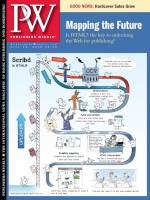"You have no imagination whatsoever. Stop writing fiction," said my mentor, after reading Overexposed, the comic novel I spent 13 years almost selling.
It started in 1995, when my brother Brian met my friend Monica, a fellow New Yorker editorial assistant. Monica, WASPy daughter of New York novelist Richard Yates, wound up marrying Brian, a Midwest Jewish doctor (like my father). She moved to Michigan and had four kids in seven years (like my mother), becoming the daughter Mom always wanted.
I'd left home postcollege, reinventing myself as an urban feminist. After Monica replaced me, I was jealous. Mining my obsessions, I sold a magazine essay an L.A. producer optioned for $1,000. The William Morris agent who handled the deal said, "Turn this into a novel and you'll make a million." A struggling journalist/adjunct professor, I turned the aspiring writer heroines into photographers, christening it Overexposed. I quit freelancing and awaited millionaire-hood.
For the next decade, agents, editors, and producers loved the idea of "two women who switched lives," but nobody bought it. Apparently, the urbanite was single and broke while the Midwestern mommy was rich and happy, so it sounded like sour grapes.
Meanwhile, many of my students were publishing—one got a $500,000 Miramax book/film deal. I felt like the wedding planner who couldn't get married. Still, I never gave up.
My mentor said, "Don't write about sisters-in-law; write about sex. You're ambivalent about her. You write better about people you love."
"It's not worth rewriting?"
"No. Burn it," she said.
I went home crying. The next day I launched a memoir about my old lovers, which sold to Delacorte Press, landing me on The Today Show. At 43, I was an overnight success. When asked, I told my students, "I banged my head against the wall for 22 years, then it took six months."
On a roll with four nonfiction books, I then chronicled my eating craziness. My editor said, "Too non-dramatic"; many food addiction authors had lost 100 pounds and I'd only gained 13. Again, I restarted, rewrote, rethought, reinvented. Some authors had luck switching genres. So I recast myself as the comic novelist I'd failed to be a decade earlier.
Alas, my editor and agent said no. Then I was dumped by the school where I taught (for $30,000 a year). By 46, I thought rejection was over. Yet Plan B, C, and D fell through, leaving me rudderless again—as Monica (who'd morphed from Midwest mom to literary executor of her father's estate) announced the major motion picture of her father's novel Revolutionary Road.
While my first novel was stillborn, her dad's—published in 1961, the year I was born—was advertised by Kate and Leo kissing, the first time since Titanic, landing on two New York Times bestseller lists. If a brilliant serious novelist couldn't find financial success until a decade after his death, what chance did I have? Feeling like a has-been who never quite was, I needed to pull another career reincarnation out of my hat.
I launched "instant gratification takes too long" writing classes at home, tripling my salary. Then I met Ryan Fischer-Harbage, who transformed himself from editor to agent and transformed my food memoir into a comic novel called Speed Shrinking.
Watching the Democratic convention on TV, I marveled at Hilary Clinton, in a gorgeous orange pantsuit, stumping for Obama, switching from loser to winner (and rediscovering herself later as secretary of state). Moved by her classy concession, I planned a book party for my cousin Jonathan Fast, a client of Ryan's debuting nonfiction (after remaking himself from sci-fi author). Ryan invited Katie Gilligan, a young St. Martin's editor who subsequently bought my food addiction novel... while I was fasting on Yom Kippur.
"It's a two-book deal," Ryan added.
I updated Overexposed and sold it—for a small advance. The millions and movie version haven't surfaced. Still, I love saying it took me until 48 to write a happy, successful 26-year-old character that pleased my 26-year-old editor. Overexposed is now so old that instead of a launch party, it's getting a book mitzvah. A rabbi's blessing it and saying, "Today you are a book," at the candle lighting ceremony, where 13 editors and agents who nurtured the project will spark a flame, like the one they kept alive all this time.
Susan Shapiro is a Manhattan author and writing teacher who can be reached at susanshapiro.net.



 Volume 257
Issue 29
07/26/2010
Volume 257
Issue 29
07/26/2010





